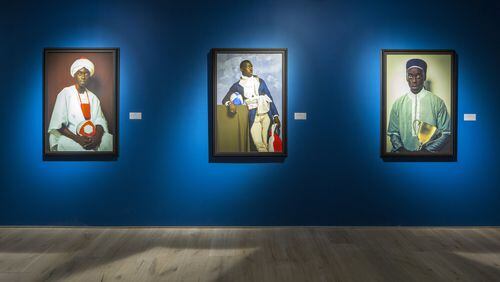Graced with an expressive face, lit-from-within skin and arresting almond eyes, the ravishing Senegalese artist Omar Victor Diop is a fascinating portrait subject in his own right. But in a series of 18 photographs currently on view at SCAD FASH Museum of Fashion and Film, Diop takes portraiture one step further, using it to examine intertwined issues of black identity, heroism, history and sports culture.
For his series “Project Diaspora,” Diop takes as his inspiration historic images of black European, African and American subjects from the 15th to the 19th centuries, adopting their attire, poses and the look of the original image. The subsequent photographs are both reverent and winking references to the original with an element of sensuality provided by Diop’s own captivating presence. Diop adds a contemporary, anachronistic detail to each photograph: a soccer ball or gloves, referee’s whistle or soccer cleat. Diop uses those sports touchstones to reference the primacy of soccer in Africa and abroad and how it offers its players a kind of social mobility also offered these historic figures, allowing them to navigate between different worlds and between racism and acceptance, adoration and rejection. Those soccer allusions also show the differing notions of masculine heroism in the past and today. In the past, politicians, warriors, soldiers and intellectuals commanded attention, while today it is more likely to be sports figures.
Diop is the star of his striking oversized photographs, but his honored subjects are the legion activists, politicians, soldiers, intellectuals and heroes he “plays” in what he refers to as “metaphorical portraits.” Diop stars in each of the images, mimicking the look of the original image, whether a painting by Girodet or Velasquez, a sculpture, illustration or early photograph. They include the American intellectual and activist Frederick Douglass; former slave Jean-Baptiste Belley, who bought his own freedom and became a political figure during the French Revolution; freed slave and British anti-slavery activist Olaudah Equiano; and an Italian saint born of slaves, Benedict the Moor. Many of Diop’s subjects led fascinating lives in times we don’t think of as particularly promising for black men, and they managed to effect political change and navigate complex societies and customs. Their stories are rich with intrigue, tragedy and nobility, which Diop honors in his meta-portraits, transforming them into heroes with contemporary resonance.
Some of the men’s lives are marked by both tragedy and an indefatigable curiosity and determination such as the Islamic scholar Omar Ibn Said, captured at age 25 and enslaved in America until his death, though he continued to author works on theology and history even in captivity. Diop’s reference point is a sepia photograph that the artist transforms into a riot of color, dressing his interpretation of Said in red pants and tie against a colorful patterned backdrop, as if transforming him into a cosmopolitan dandy, rescuing and transporting him from the realities of his life.
In the gorgeous image “Frederick Douglass” Diop adopts Douglass’ distinctive hairstyle, and his elegant patterned bow tie and vest, which Diop extends into the elaborately patterned backdrop in a gesture that feels like both homage and a kind of valorization. Like Kehinde Wiley, whose paintings are rich with elaborate, rococo detail and pattern, Diop’s photographs drape his subjects in richly patterned fabrics and against exquisitely decorative backdrops. That ornamentation becomes its own form of adoration. Beautifully printed in glowing, pulsing colors, the photographs hover in a delightfully ahistorical place, referencing the past but devastating with contemporary relevance.
“Omar Victor Diop: Project Diaspora”
Through Aug. 20. 10 a.m.-5 p.m. Tuesdays-Wednesdays and Fridays-Saturdays; 10 a.m.-8 p.m. Thursdays; noon-5 p.m. Sundays. $10, adults; $8, seniors and military; $5, college students with ID and SCAD alumni; Free, children under 14 and SCAD students/faculty/staff. SCAD FASH, 1600 Peachtree St. N.W., Atlanta. 404-253-3132, www.scadfash.org
Bottom line: Beautifully realized photographs from a Senegalese artist revere and reanimate the history of black men in the West and Asia.
About the Author






